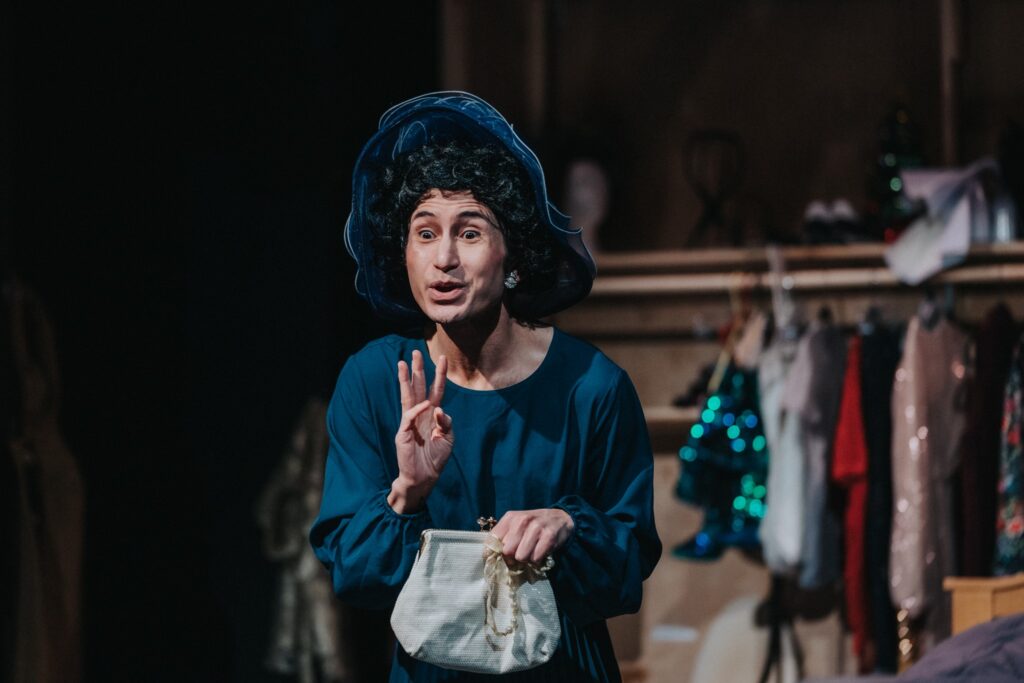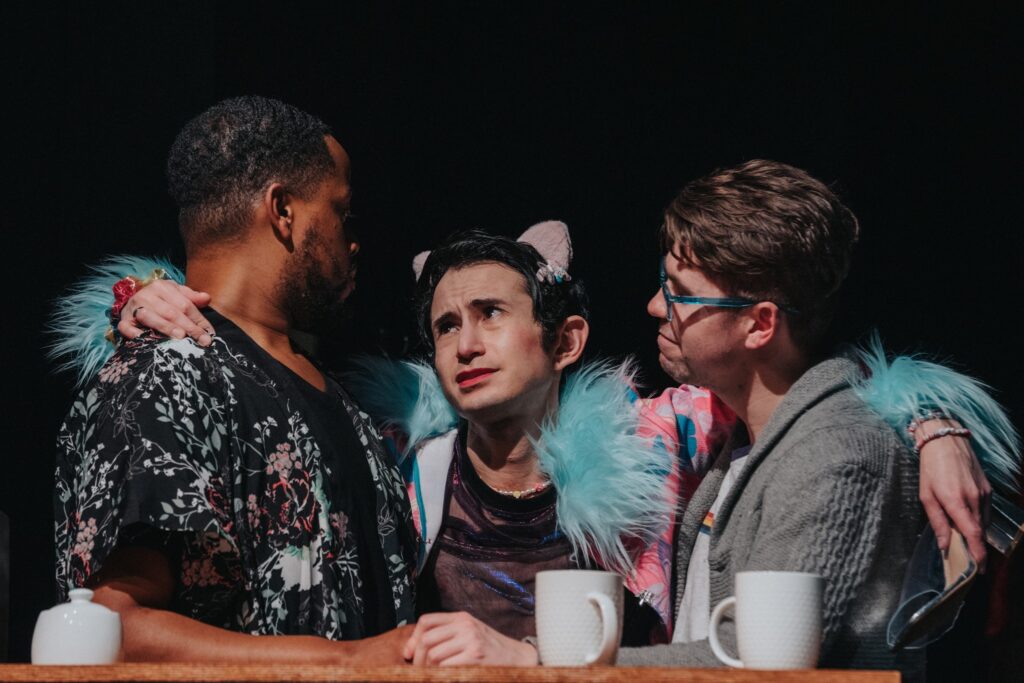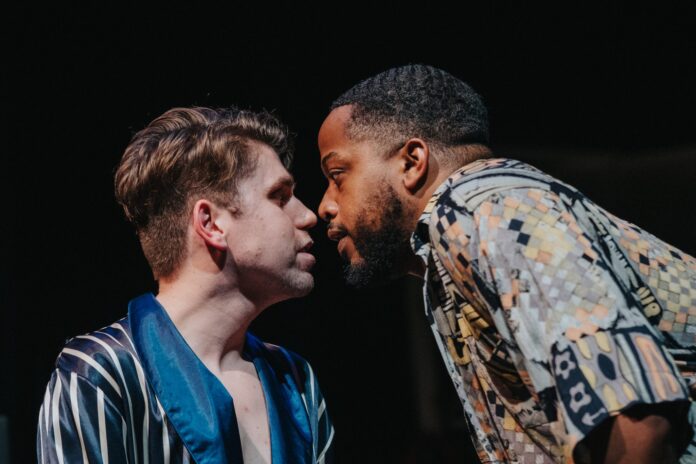Tom Swift’s A Marriage (world premiere run through Sun/19 at Live Oak Theater, Berkeley) is the sort of play for which time is a curious thing. It’s broken up into 10-15 min scenelets, with each successive piece taking place a few years after its predecessor. Yet one scene will have mentions of Lady Gaga, while the next one discusses Eminem’s homophobia as if it’s 2001 all over again. The use of a first-gen iPod only muddies the waters more. Though the characters appear to follow a linear narrative, it’s tough to tell just when these events transpire on a calendar.
Time is also crucial to the play’s meta-narrative, in which the two unnamed actors (Devin Cunningham and Max Seijas) and their house manager (Tim Garcia) are, well, two actors putting on a play with the help of the theatre’s house manager. This leads to frequent breaking of the fourth wall so they can kvetch about queer theatre clichés, the house manager having to stand in for two actors absent with hangovers, and the fact that the clock is ticking on the amount of time to finish the play.
The play-within-the-play, if it can even be called as such, is the age-old story about a one-night stand that suddenly becomes a lifelong romance. Richard (Seijas) and Donald (Cunningham) have a passionate pre-Christmas tryst that escalates quickly when the two seriously declare their love for one another. The next morning, Daniel straight up proposes to Richard, ‘cause why not? The wedding nearly happens three years later in Canada, but doesn’t. What follows for the remainder of the two-and-a-half-hour runtime is an episodic rollercoaster of the two in-and-out of everything—therapy, love, and even the story of the play itself.

This sort of episodic narrative is hard to get right. Even 1956 classic Giant—with Rock Hudson, Elizabeth Taylor, and James Dean—frequently came dangerously close to short-changing its characters as it played hopscotch through the decades. And although that film used racism as a lesser theme, A Marriage’s step into the trope is specifically focused on queer relationships. It’s a noble vantage point, but all the more difficult to pull off well. (I say this as the someone who thinks Terence McNally’s Some Men is overrated, but Patricia Cotter’s The Daughters, which I saw in in development, has the potential to be a classic.)
Swift’s play works best when it doesn’t try so hard to make grand statements about queer history, especially since the timeline is so hard to nail down. It’s most gripping when it acknowledges that even the most devout couples could benefit from therapy, or when it shows how easily the mentorship of a queer elder can stand in place of actual parental guidance. In fact, one of Garcia’s many roles as the house manager involves playing Donald’s recently-outed nephew.
But therein lies the problem: when those issues do come up, the play doesn’t do much beyond acknowledge them. A running plot point of the meta-narrative is how Donald’s actor is frustrated that the topic of race isn’t seriously brought up. The house manager’s non-binary identity is brought up, but doesn’t really factor into the proceedings. And the specter of HIV/AIDS gets a brief mention at the start only to not be mentioned again.
Both the characters and meta-characters acknowledge these issues as important, but do little else. It’s as if paying their existence lip service can overcome the lack of in-depth analysis.
The paucity of HIV/AIDS depth is disappointing because, although it’s a well-worn cliché in queer theatre, playwright Swift speaks of his own HIV+ status in his bio. Plus, it’s hard to ignore it with the world still in the grips of another deadly virus. Despite being detailed on their website and signs all over the theatre, there was no COVID vax check opening night. People walked in and out of the theatre without their masks and group of five or six men never wore masks at all. CO² levels peaked around 1108ppm on my Aranet4.

Still, the play has appeal when not succumbing to “OK, boomer” snootiness. The cast, as directed by Richard Mosqueda (who recently directed Garcia in A Picture of Two Boys at NCTC), bring an invigorating level of energy and pathos to their roles. Also holding our attention throughout is the set by scenic designer Christopher Jones. Meant to evoke a backstage dressing room (costumes are by Bethany Deal), it also seamlessly doubles as a bedroom, kitchen, therapist’s waiting room, hospice bed, and more. It features the play’s title hanging above in cardboard letters that occasionally light up—as does a disco ball, which you’d miss if you weren’t paying attention.
A Marriage isn’t a bad play, but it’s weighed down by its urge to be everything, cover every topic, and exist at every point in time. Even some of the best works have buckled under that pressure, whether they placed it on themselves or not. As a character study of a long-term relationship, it has moments that really shine. As a fictional document about the history of queer identity, its eyes were bigger than its stomach.
A MARRIAGE runs through February 19 at Live Oak Theater, Berkeley. Tickets and further info here.





